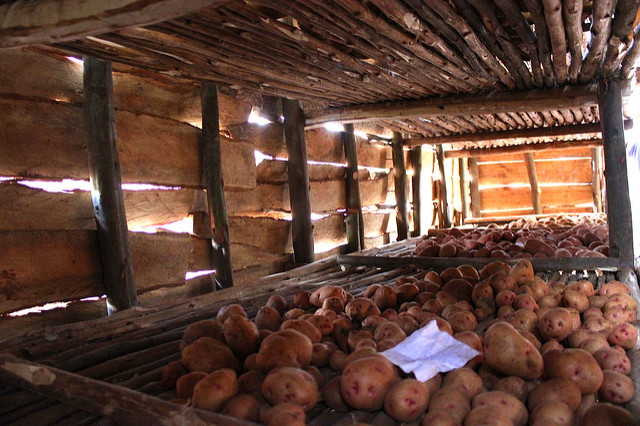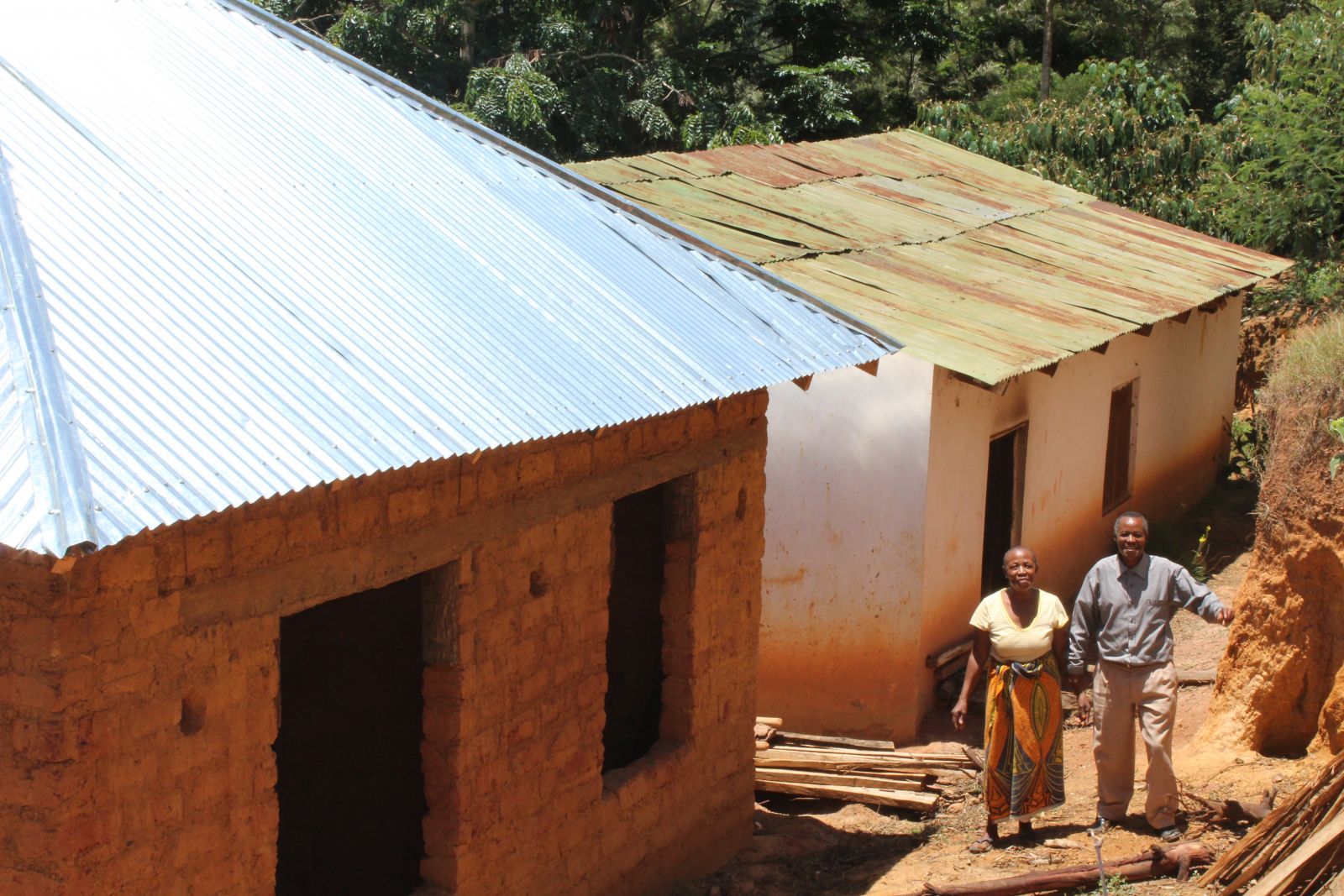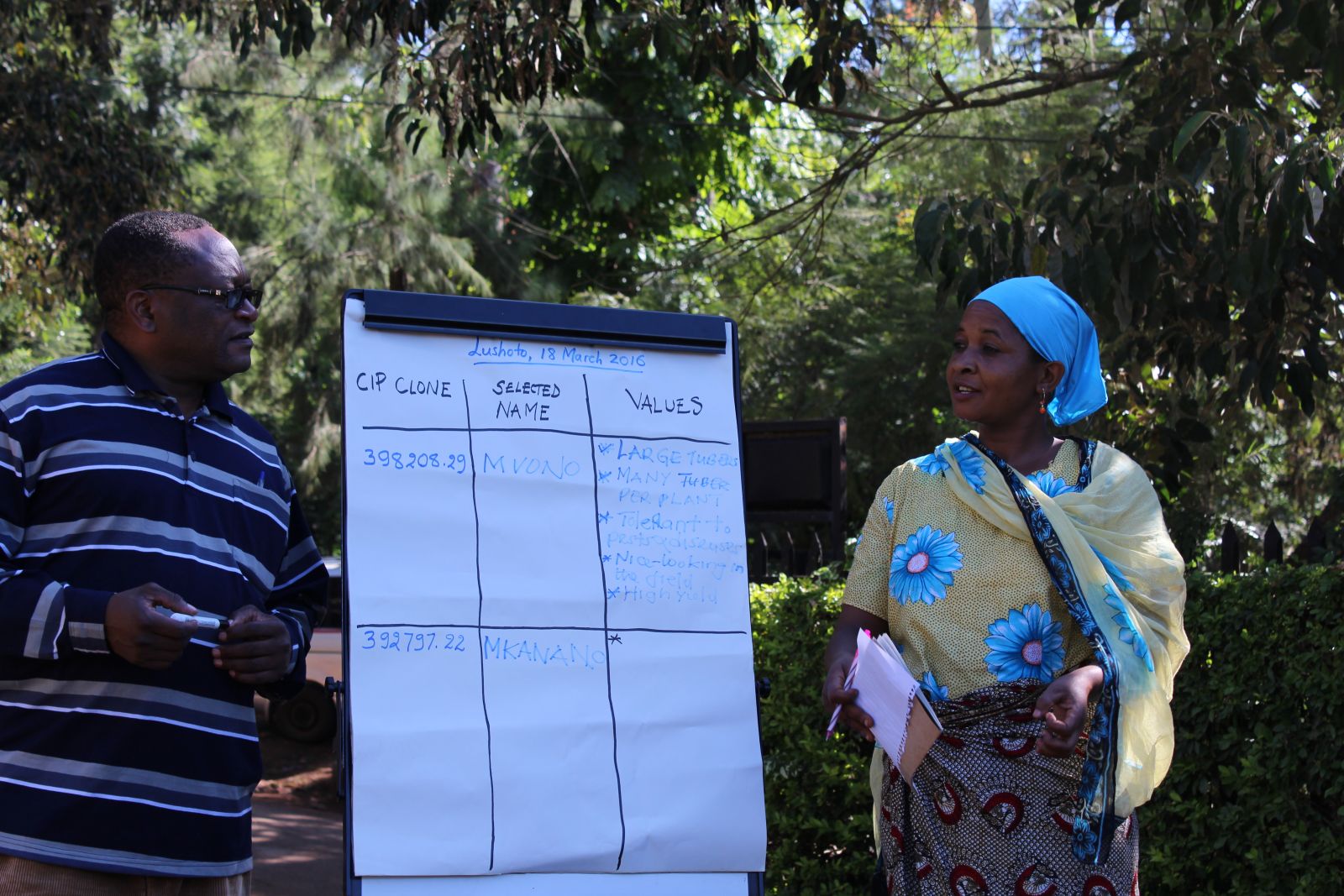
On-farm trials in Lushoto, Tanzania has led to identification of better adapted potato varieties that are high yielding .
In this picture, Lushoto farmers proudly showcase Asante potatoes. Photo: S. Quinn (CIP)
(view original)
Asante means thank you in Swahili; for potato farmers in Lushoto, the name refers to a new high yielding potato variety with good market value that is changing their lives each crop season!
Samuel Tendwa, a potato farmer, has cultivated his one and a half acre piece of land for more than 20 years. In a typical year, he would grow cabbages, sweet pepper, mustard, beans and round potatoes. However, with each passing year, Tendwa struggled to earn enough to support his family of seven. He hails from the village of Maringo in Lushoto; a hilly and mostly populated rural district in Northern Tanzania.
Lushoto’s population density is estimated to be over 134 persons per square kilometer. Agriculture is the main source of livelihood for the majority of households. Main crops grown include maize, beans, tomatoes, cassava and potatoes. However, recurrent droughts, prolonged dry spells and variable rainfall patterns have affected household food security. According to a survey conducted in 2011, about 96% of households had more than one food deficit month in a year.
For potato farmers, such as Tendwa, unavailability of good seed tubers of appropriate varieties close to the planting season posed another challenge making it difficult to exploit the two main rainy seasons experienced by the area each year.
In 2013, Tendwa’s life began to change when he received for the first time formal training in integrated potato crop management through a partnership of the International Potato Center (CIP), Horticulture Research Institute (HORTI Tengeru), Selian Agriculture Research Institute (SARI – Arusha) and the District office of Lushoto. This initiative was supported by the CGIAR Research Program on Climate Change, Agriculture and Food Security (CCAFS).
Together with 36 other farmers, they learnt all aspects of the potato value chain, including production, protection, storage and market linkages which spanned three growing seasons. The farmers learnt about the benefits of crop rotation especially in the control of pests and diseases. They also learnt how to incorporate a three-month potato crop into their agricultural systems and keep land productive year-round. In 2014, Tendwa was among 70 other farmers who worked with CIP and partners to evaluate new potato varieties during four consecutive growing seasons in five villages of Lushoto.
Read more: Improving potato yields for farmers in the Usambara Highlands
Asante potatoes in a seed bank in Lushoto. Photo: S. Quinn (CIP)
In the 2014 short rainy season Tendwa and nine other farmers from his village each received one 80 kilogram bag of clean potato seed variety called Asante. With newly acquired knowledge and skills in seed potato production techniques, he planted the new seed and harvested 13 bags. He sold ten as seed receiving more than 100,000 Tanzanian shillings (TSh) per bag (around USD50) giving him his first-ever on-farm profit. The remainder was kept as seed for the subsequent planting season.
Seeing the increase in production, Tendwa decided to triple his investment in 2015 by planting three bags of Asante seed. At harvest he was happily surprised to count 47 bags. He then sold 43 bags as seed tubers at 120,000 TSh (approximately 60 USD) per bag, earning over 5 million TSh (approximately 2500 USD).
“I never knew I could receive substantial income from farming,” he said. “Asante is a completely new potato variety in our area, and with the help of these researchers, I have learned to produce high-quality potato for seed and consumption. This has given me hope, success and new status in my village,” said Tendwa, who is constructing a modern house with improved sanitation facilities for his family. Seeing his success, five of his relatives are following in his footsteps; producing quality potato seed with an aim to improve their lives.
Samuel Tendwa together with his wife. He is constructing a new house (left) from his potato enterprise. Photo: D. Harahagazwe (CIP)
Wider acceptance of high yielding varieties
In March 2016, Tendwa and other farmers in Lushoto proposed to name two other high yielding potato seed trial materials from CIP. These were tested during four growing seasons in late 2013 and early 2016. The material CIP398208.29 was baptized MVONO, due to its high yielding ability in terms of number and size of tubers and material CIP392797.22 was named MKANANO, meaning highly competitive due to its high yielding ability and red skin color which is mostly preferred at local markets and big cities like Dar es Salaam and Arusha in Tanzania.
Formal release of MVONO and MKANANO has begun.
Consultations regarding the naming of newly tested high yielding potato materials.Photo: D. Harahagazwe (CIP)
Additional reading:
- Learn more about participatory action research activities in Lushoto: Climate-smart villages and progress in achieving household food security in Lushoto, Tanzania



